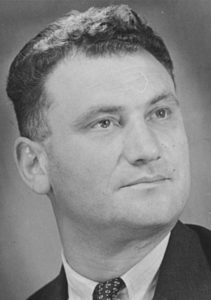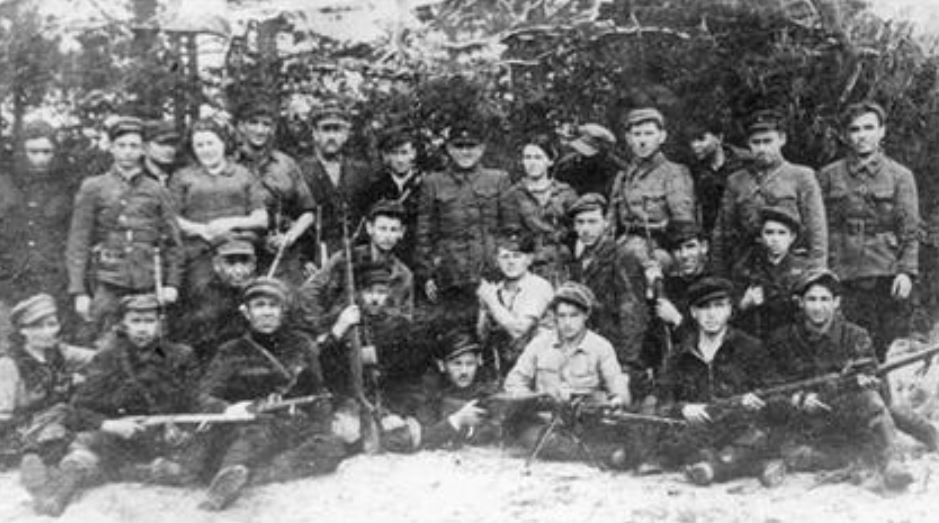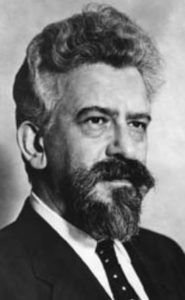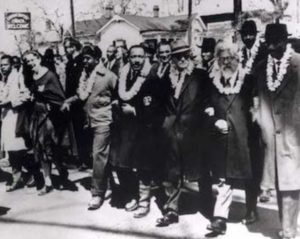Father of Spiritual Zionism
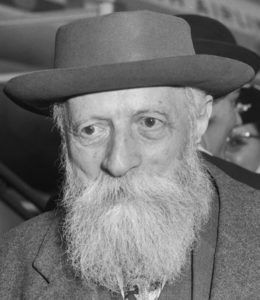 Mordechai Martin Buber (1878-1965) was born in Vienna to a religious Jewish family. His parents got divorced when he was just three years old, so Buber was raised in what was then Poland by his grandfather. Despite growing up in a richly Hasidic home, Buber began reading secular literature and returned to Vienna as a young man to study philosophy. Around the same time, he became active in the Zionist movement and soon became the editor of Die Welt, the main newspaper of Zionism. It wasn’t long before Buber became dissatisfied with the secularism and “busyness” of Zionism and returned (partially) to his Hasidic roots. He saw in Hasidic communities the right model for a new Israel, and a better alternative to the entirely-secular kibbutz. Buber ultimately saw Zionism not as a nationalist or political movement, but as a religious movement that should, first and foremost, serve to spiritually enrich the Jewish people—along with the rest of the world. He would later be credited with being the father of “Hebrew humanism” and “spiritual Zionism”. In 1908, he was invited to address a group of Jewish intellectuals known as the “Prague Circle”, and to “remind them about their Judaism”, as the group’s leader had requested. Among the members of the Circle was (former Jew of the Week) Franz Kafka, who was greatly influenced by Buber. During World War I, Buber established the Jewish National Committee to provide relief for Jews, especially those suffering in Eastern Europe. Throughout all these years, Buber wrote penetrating works on a vast range of themes, including philosophy and psychology, mythology, mysticism, and Hasidism. He co-produced a new translation of the Tanakh into German, and published his most famous essay, “I and Thou”. In 1930, Buber became a professor at the University of Frankfurt. He resigned in protest three years later when Hitler came to power. The Nazis forbade Jews from participating in public adult education classes, so Buber founded the Central Office for Jewish Adult Education. In 1938, he made aliyah and settled in Jerusalem, becoming professor of anthropology and sociology at the Hebrew University. Several years later, he was a founding member of the Ihud party, which prioritized making peace with neighbouring Arabs and worked to establish a bi-national state. Buber was nominated for a Nobel Prize a whopping 17 times (ten times for Literature, and seven times for Peace), though he was never awarded one. He did win the Israel Prize and the Bialik Prize, among many others. Today, the 13th of Sivan, is his yahrzeit.
Mordechai Martin Buber (1878-1965) was born in Vienna to a religious Jewish family. His parents got divorced when he was just three years old, so Buber was raised in what was then Poland by his grandfather. Despite growing up in a richly Hasidic home, Buber began reading secular literature and returned to Vienna as a young man to study philosophy. Around the same time, he became active in the Zionist movement and soon became the editor of Die Welt, the main newspaper of Zionism. It wasn’t long before Buber became dissatisfied with the secularism and “busyness” of Zionism and returned (partially) to his Hasidic roots. He saw in Hasidic communities the right model for a new Israel, and a better alternative to the entirely-secular kibbutz. Buber ultimately saw Zionism not as a nationalist or political movement, but as a religious movement that should, first and foremost, serve to spiritually enrich the Jewish people—along with the rest of the world. He would later be credited with being the father of “Hebrew humanism” and “spiritual Zionism”. In 1908, he was invited to address a group of Jewish intellectuals known as the “Prague Circle”, and to “remind them about their Judaism”, as the group’s leader had requested. Among the members of the Circle was (former Jew of the Week) Franz Kafka, who was greatly influenced by Buber. During World War I, Buber established the Jewish National Committee to provide relief for Jews, especially those suffering in Eastern Europe. Throughout all these years, Buber wrote penetrating works on a vast range of themes, including philosophy and psychology, mythology, mysticism, and Hasidism. He co-produced a new translation of the Tanakh into German, and published his most famous essay, “I and Thou”. In 1930, Buber became a professor at the University of Frankfurt. He resigned in protest three years later when Hitler came to power. The Nazis forbade Jews from participating in public adult education classes, so Buber founded the Central Office for Jewish Adult Education. In 1938, he made aliyah and settled in Jerusalem, becoming professor of anthropology and sociology at the Hebrew University. Several years later, he was a founding member of the Ihud party, which prioritized making peace with neighbouring Arabs and worked to establish a bi-national state. Buber was nominated for a Nobel Prize a whopping 17 times (ten times for Literature, and seven times for Peace), though he was never awarded one. He did win the Israel Prize and the Bialik Prize, among many others. Today, the 13th of Sivan, is his yahrzeit.
Words of the Week
The real struggle is not between East and West, or capitalism and communism, but between education and propaganda.
– Martin Buber

